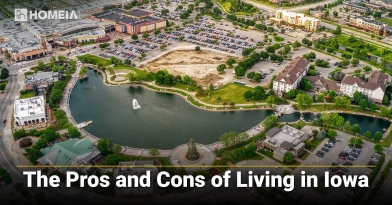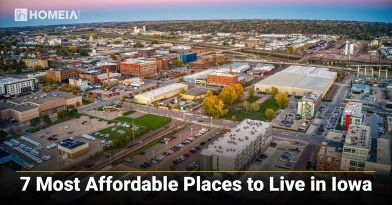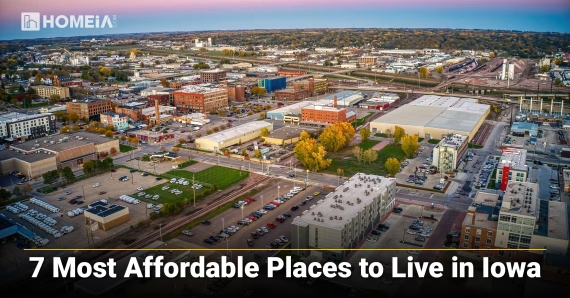Moving to Iowa: The Complete Relocation Guide & Checklist
- Local Editor:Local Editor: The HOMEiA Team
Published: Nov 13, 2025
- Category: City Living Guide
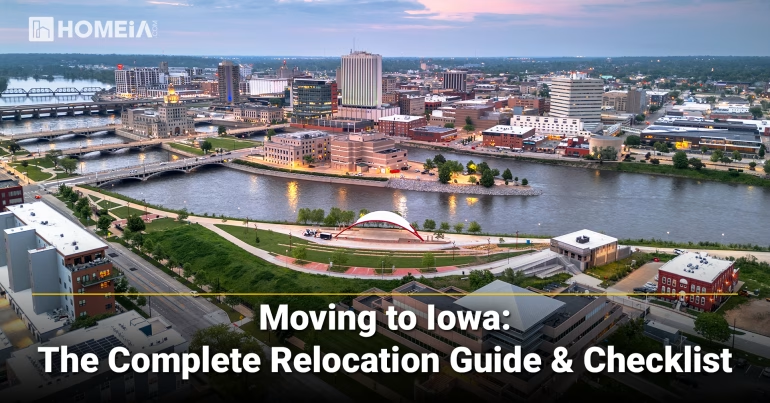
Bordered by six states and home to rolling plains and vibrant cities, Iowa offers a lifestyle defined by close-knit communities, agricultural heritage, and Midwestern values. About 3.2 million residents call The Hawkeye State home, drawn by affordable living, exceptional schools, and a stable economy. Des Moines provides urban amenities with a small-town feel, while hundreds of smaller communities dot a landscape of cornfields, river valleys, and prairie landscapes.
Known for its caucuses, agricultural production, and friendly communities, this part of the American Midwest offers newcomers—a low overall cost of living, ideal job market, and family-friendly environment. This comprehensive guide covers essential relocation information, from preparing for the climate and understanding costs to navigating the legal requirements of moving to Iowa becoming an Iowa resident.
Table of Contents:
Key Takeaways
- The Affordable Cost of Living: Iowa’s overall cost of living is about 10% below the U.S. average. Housing is significantly more economical than in most other states, making it an attractive option for families and first-time homebuyers.
- Four Distinct Seasons: Prepare for a continental climate with treacherous and warm, humid summers. Spring and fall offer pleasant weather, but severe weather including thunderstorms and tornadoes can occur.
- Strong, Diverse Economy: Agriculture, manufacturing, insurance, and healthcare are the state’s economic pillars, offering reliable employment across multiple sectors. The unemployment rate typically remains below the national average.
- Community-Focused Lifestyle: Daily life centers around family, community events, and outdoor activities. There’s a strong emphasis on education and community involvement.
- Safety & Infrastructure: This state consistently ranks among the safest in the nation, with exceptional schools and reliable infrastructure throughout most communities.
I. Methodology: How We Built This Guide
Our relocation timeline and recommendations are based on a multi-factor analysis of the key elements that impact a move to Iowa. We compiled data from verified 2026 sources, including the U.S. Census Bureau, Bureau of Labor Statistics, Zillow housing market reports, FBI crime statistics, and Iowa state agencies.
Our evaluation criteria for advice and city selection are weighted as follows:
- Housing & Affordability (30%): Analyzing median home prices, rental costs, and utility averages to provide accurate budgeting advice.
- Access & Logistics (25%): Assessing the practicalities of moving goods and vehicles into the state, considering its central location and transportation networks.
- Legal & Administrative Requirements (20%): Outlining essential steps for establishing residency, including vehicle registration, driver’s licensing, and voter registration.
- Community & Lifestyle Integration (15%): Providing insights into cultural norms, community events, and tips for building a social network.
- Economic Preparation (10%): Offering guidance on job searching and financial planning specific to the state economy.
Our Methodologies to create HOMEiA Score Ratings for Each Group of Content
HOMEiA uses a consistent, data-driven methodology to evaluate U.S. states for livability, affordability, and long-term value. Our analysis centers on key factors such as Housing and Affordability, Cost of Daily Living, Access and Infrastructure, Community Strength, Safety and Quality of Life, Economic Resilience and Job Market…
1. What Is It Really Like to Live in Iowa?
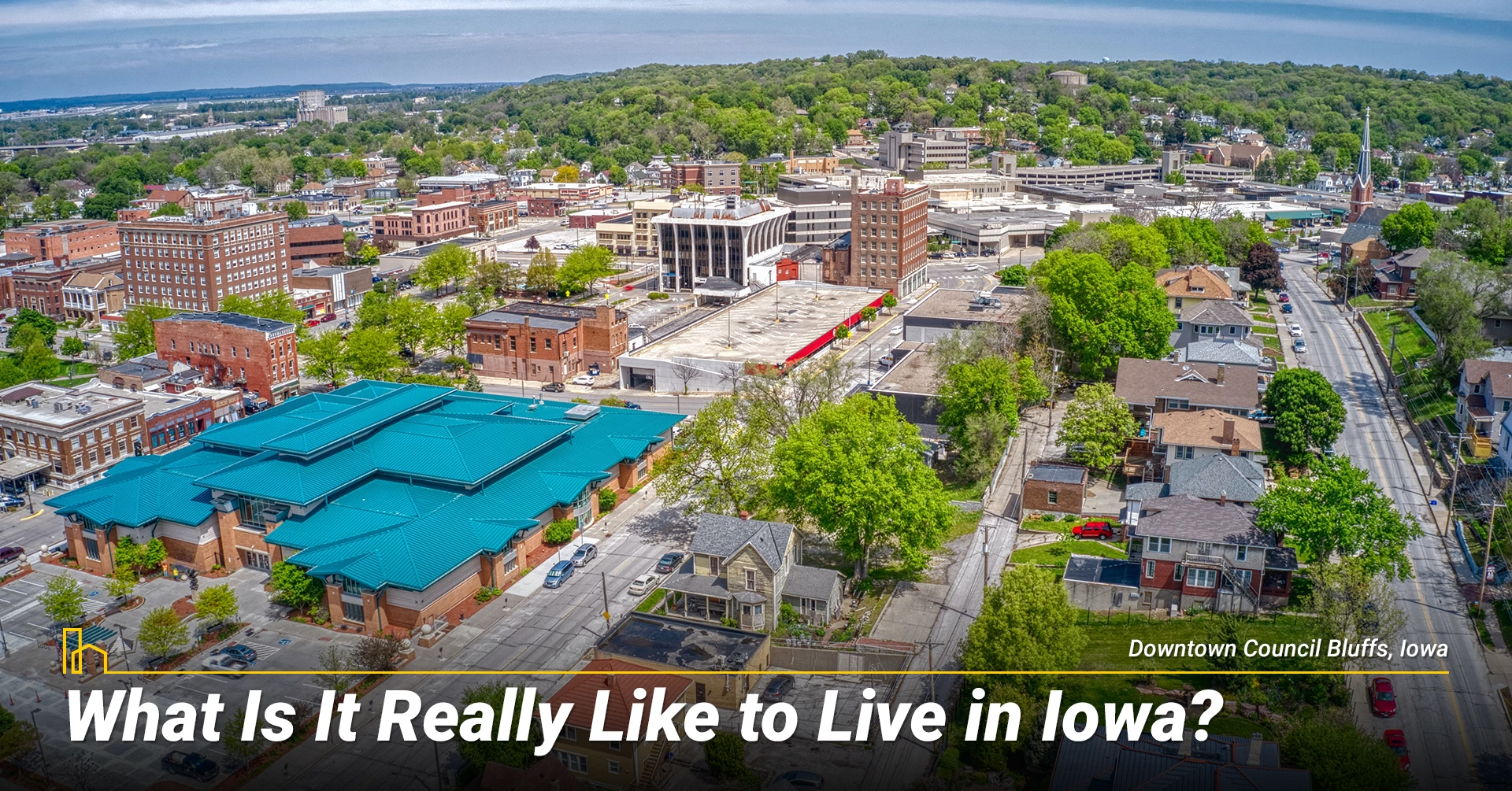
A. Culture & Lifestyle: Iowa’s culture is rooted in Midwestern values of hard work, community, and family. There’s an emphasis on neighborliness, with people generally friendly and willing to help newcomers. The pace of life is generally slower and more relaxed than in major coastal cities. Community events including county fairs, farmers’ markets, and high school sports are cornerstone activities, providing newcomers with natural opportunities to integrate and experience the state’s authentic character.
B. Arts, Sports, and Entertainment: IA offers a surprising variety of cultural and recreational opportunities. Major cities including Des Moines and Cedar Rapids boast world-renowned museums, performing arts centers, and vibrant downtown scenes. Being home to the Iowa State Fair, one of the largest and most famous state fairs in the country. For sports fans, there are minor league baseball teams in several cities and powerhouse college programs at the University of Iowa and Iowa State University. Outdoor recreation includes extensive trail systems, state parks, and water activities on the Mississippi and Missouri Rivers. For a look at cultural life in another state, you might explore what it’s like to live in Tennessee.
The Pros and Cons of Living in Iowa
Iowa is more than farmland and rolling hills—it’s a state built on community, affordability, and Midwestern charm. However, challenges like cold winters, fewer entertainment options, and agricultural reliance remain. This guide explores Iowa’s pros and cons, plus its best cities for professionals, families, and retirees seeking balanced Midwest living.
C. Food Scene & Nightlife: This food scene reflects its agricultural heritage, with farm-to-table dining becoming increasingly popular. Known for its pork products, sweet corn, and craft beer scene. While fine dining thrives in larger cities, nightlife is generally low-key and centered around local breweries, wineries, and community events rather than clubbing. Smaller towns will likely have beloved watering holes that serve as community hubs.
D. Outdoor Recreation & Natural Beauty: Outdoor recreation is accessible throughout Iowa, with opportunities for every season.
- State Parks & Natural Areas: The Hawkeye State has over 70 parks offering hiking, camping, fishing, and wildlife viewing.
- Water Activities: The Mississippi and Missouri Rivers provide boating, fishing, and water sports opportunities.
- Trail Systems: Extensive bike trails and hiking paths connect communities across the state.
- Winter Sports: Cross-country skiing, snowshoeing, and ice fishing are popular winter activities.
E. Climate: Iowa experiences four distinct seasons with a continental climate:
- Winter (December-February): Unforgiving with temperatures ranging from 10°F to 30°F. Snowfall averages about 30-40 inches annually.
- Spring (March-May): Variable weather with temperatures from 40°F to 70°F. Severe thunderstorms and tornadoes are possible.
- Summer (June-August): Warm and humid with temperatures from 70°F to 90°F. High humidity can make it feel warmer.
- Fall (September-November): Pleasant and mild with temperatures from 50°F to 70°F. Beautiful foliage colors.
Recommended for you
2. Cost of Living & Affordability

Affordability is one of this state’s greatest assets. Let’s break down the costs.
A. Housing Market: Housing costs vary by city and region.
Housing Type | Des Moines | Cedar Rapids | Davenport | Iowa City | Waterloo |
|---|---|---|---|---|---|
| Median Home Price | $275,000 | $240,000 | $180,000 | $320,000 | $150,000 |
| Avg. 2-Bedroom Rent | $1,100 | $950 | $850 | $1,200 | $750 |
B. Daily Expenses
Monthly Expense Category | Average Cost | Notes |
|---|---|---|
| Utilities (HVAC Focus) | $150-$250 | Heating costs can be significant in winter; cooling moderate in summer |
| Groceries (Family of 4) | $450-$700 | Slightly below national average due to agricultural abundance |
| Gasoline | ~$3.10/gallon | Prices typically below national average |
| Internet | $60-$90 | Generally reliable service throughout most of the state |
3. Jobs & Economy

Iowa’s economy is diverse and stable, driven by several key sectors:
- Agriculture: The foundation of Iowa’s economy, with corn, soybeans, pork, and ethanol production leading the way.
- Manufacturing: A major employer, particularly in food processing, machinery, and advanced manufacturing.
- Insurance & Financial Services: Des Moines is a major insurance hub, home to several large insurance companies.
- Healthcare: A growing sector with major medical centers in urban areas and regional hospitals throughout the state.
- Education: Strong public education system and several major universities provide employment opportunities.
The 5 Best Places to Live in Iowa: A City Comparison
Iowa blends small-town warmth with modern opportunity, offering both agricultural roots and urban sophistication. This guide highlights the five best Iowa cities to live in 2026, based on affordability, opportunity, safety, and quality of life—from bustling Des Moines to scholarly Iowa City—helping you find your perfect Midwestern home.
4. Planning Your Move: A Timeline

A successful move requires planning, especially if coming from a great distance.
Timeline | Essential Tasks | Important Details |
|---|---|---|
| 8-12 Weeks Before | Plan & Research | Get moving quotes, create budget, research new state laws, start decluttering |
| 6-8 Weeks Before | Notify & Pack | Give notice to your landlord, collect boxes, pack off-season items, transfer medical files |
| 4-6 Weeks Before | Transfer Services | Schedule utility shutoff/start, file USPS change of address, find new doctors, register kids for school |
| 2-4 Weeks Before | Finalize Details | Finish packing, plan travel route, confirm mover schedule, fill prescriptions |
| 1-2 Weeks Before | Prepare to Go | Pack essentials box, defrost fridge, clean home, confirm utility dates |
| Moving Day | Execute Move | Oversee loading, do final walkthrough, keep documents handy |
| After Arrival | Settle In | Unpack basics first, update license/registration, explore new town |
=> Get the Relocation Guide & Checklist PDF — prepared for both Desktop and Mobile devices.
5. Transportation
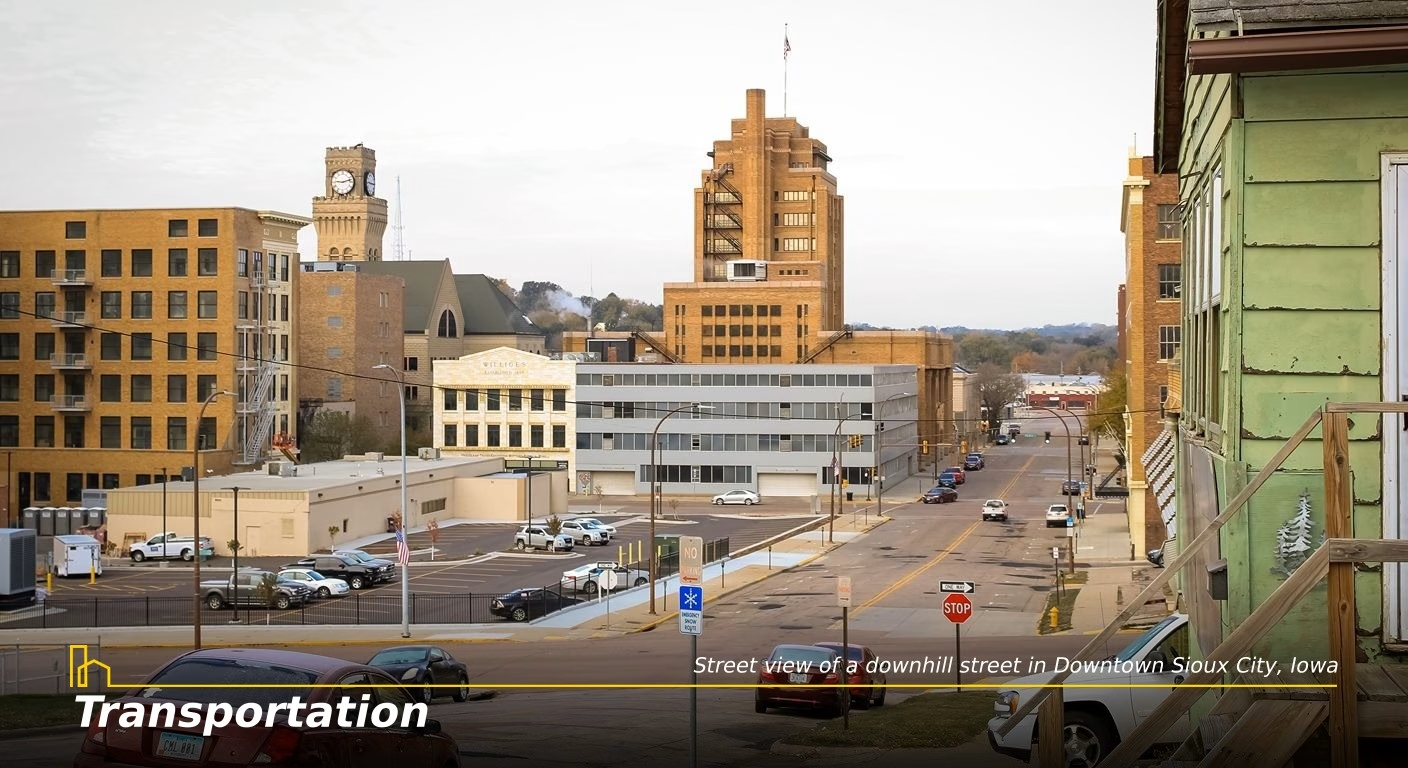
- Driving: I-80 runs east-west across the state, and I-35 runs north-south. These are Iowa’s main transportation corridors. Rural communities are connected by state highways and county roads.
- Flying: Des Moines International Airport (DSM) is the major hub. Smaller airports in Cedar Rapids, Quad Cities, and Sioux City offer connecting flights.
- Public Transit: Larger cities have bus systems, but cars are essential for most residents, especially in rural areas.
- Winter Driving: Winter tires or all-weather tires are recommended from November to March. Carry an emergency kit in your car during winter months.
7 Most Affordable Places to Live in Iowa (updated)
Iowa offers more than farmland and friendly faces—it’s one of the most affordable states to call home. With low housing costs and a stable economy, it’s ideal for families, retirees, and remote workers. This guide highlights seven budget-friendly Iowa communities for 2025, balancing cost, comfort, and Midwestern charm.
6. Legal Requirements & Paperwork
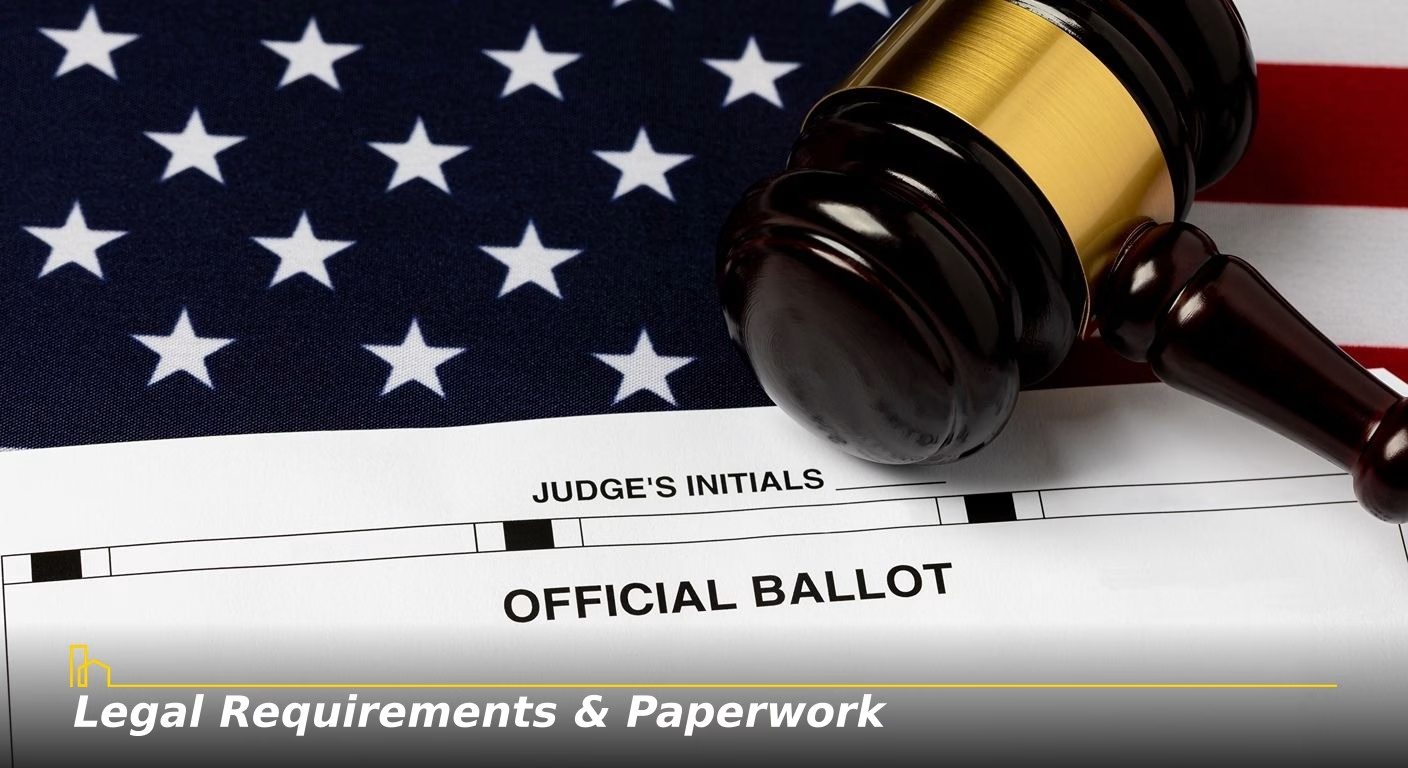
New residents must complete several tasks:
- Vehicle Registration: Required within 30 days of establishing residency. One needs out-of-state title, proof of Iowa insurance, and a VIN inspection.
- Driver’s License: Required within 30 days. You must surrender your previous license. What’s needed is proof of identity, residency, and Social Security Number.
- Voter Registration: Registering to vote can occur when applying for your driver’s license.
- Other: If you plan to hunt or fish, you will need to purchase a state license.
7. Financial Planning

Create a realistic budget accounting for moving expenses (moving truck or pod rental, travel). Keep housing expenditures below 30% of your income. Build a healthy emergency fund (3-6 months) due to potential seasonal employment variations in some industries. Take advantage of the low cost of living to pay down debt or increase savings.
8. Insider Tips from Locals

- Embrace the Seasons: Invest in quality winter gear and learn to appreciate each season’s unique activities and beauty.
- Get Involved: Join community organizations, volunteer, or participate in local events to quickly become part of the community.
- Explore the Outdoors: Take advantage of Iowa’s extensive park system and recreational opportunities.
- Support Local: Farmers’ markets and local businesses are the heart of many communities. Supporting them helps you connect with your new home.
- Be Prepared for Weather: Keep emergency supplies on hand and stay informed about weather conditions, especially during severe weather.
Conclusion
Moving to Iowa offers the opportunity to build a stable, affordable life in a community-focused environment. A rooted economy, exceptional schools, and safe communities make it an attractive option for families, young professionals, and retirees alike. While the climate presents challenges, the four distinct seasons offer variety and beauty throughout the year. With thorough preparation and an open mind, your relocation to the Hawkeye State can be the start of a rewarding new chapter. For those still considering options, our guide on moving to Colorado might provide an interesting comparison.
Recommended for you
Frequently Asked Questions About Moving to Iowa
1. What is the first step to moving to Iowa?
The absolute first step is to secure housing and, if applicable, employment. With a low cost of living, having these secured will make your transition smooth and stress-free.
2. Should I drive or ship my car to Iowa?
Driving is almost always the most convenient and cost-effective option. Iowa is easily accessible via major interstates (I-80 and I-35). Shipping a car can be expensive and typically unnecessary unless you are moving from an extreme distance and cannot drive.
3. How do I get my belongings to Iowa?
For large moves, using a national moving company or renting a truck is common. Pod-like services are also readily available. For smaller loads, using a freight service or driving a rented trailer can be cost-effective.
4. What should I pack vs. buy there?
Bring all essential documents, specialized gear, and personal items. Everyday household items, furniture, and bulky goods are better purchased in Iowa to avoid high moving costs. You can find great deals at stores or on Facebook Marketplace once you arrive.
5. Is it hard to make friends in Iowa?
Generally, no. Iowans are famously friendly and welcoming to newcomers. Join community groups, recreational sports leagues, volunteer, or take a class to meet people quickly. Showing up to local events is the fastest way to integrate into your new community.
HOMEiA is a city guide site where visitors can find detailed information about communities of interest. HOMEiA’s City Guides, created in partnership with local writers and editors, are curated lists of the best, safest, and most affordable places to live. The guides feature the HOMEiA Score, a proprietary index that rates communities on such factors as housing costs, education, employment, etc.
HOMEiA.com aims to be the premier site for people planning to relocate, providing them with insightful content and connecting them with skilled real estate professionals.
We also empower real estate professionals to establish or strengthen their web presence by highlighting their experience, knowledge and achievements. If you’re selected to join our list of certified real estate professionals, you will distinguish yourself from your peers — and earn HOMEiA’s support.
If you believe in HOMEiA’s mission, please share our website with others.


